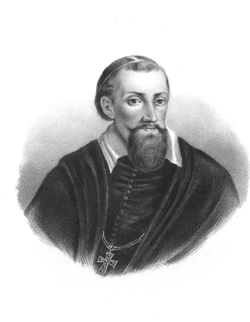
Andrzej Krzycki
Encyclopedia


Renaissance
The Renaissance was a cultural movement that spanned roughly the 14th to the 17th century, beginning in Italy in the Late Middle Ages and later spreading to the rest of Europe. The term is also used more loosely to refer to the historical era, but since the changes of the Renaissance were not...
Polish
Polish language
Polish is a language of the Lechitic subgroup of West Slavic languages, used throughout Poland and by Polish minorities in other countries...
writer and archbishop. Krzycki wrote in Latin prose, but wrote poetry in Polish. He is often considered one of Poland's greatest humanist writers.
He earned an education at the University of Bologna
University of Bologna
The Alma Mater Studiorum - University of Bologna is the oldest continually operating university in the world, the word 'universitas' being first used by this institution at its foundation. The true date of its founding is uncertain, but believed by most accounts to have been 1088...
studying under prominent humanists, and started a career in church hierarchy in 1501. In 1512, Barbara Zapolya
Barbara of Celje
Barbara of Cilli was the spouse of Holy Roman Emperor Sigismund and as such Holy Roman Empress. She was by marriage also Queen of Hungary and Bohemia and also Holy Roman Empress. She received the sobriquet "Messalina of Germany" for her political intrigues, and was instrumental in creating the...
married King Sigismund I the Old
Sigismund I the Old
Sigismund I of Poland , of the Jagiellon dynasty, reigned as King of Poland and also as the Grand Duke of Lithuania from 1506 until 1548...
. Krzycki wrote a verse to commemorate this marriage, and became Zapolya's secretary the same year. When the king won the victory of Orsza, he again wrote a poem, and sent verses purporting to be from the queen to her absent husband after the model of Ovid
Ovid
Publius Ovidius Naso , known as Ovid in the English-speaking world, was a Roman poet who is best known as the author of the three major collections of erotic poetry: Heroides, Amores, and Ars Amatoria...
's Epistolae Heroidum; these, in a letter to Krzycki, Erasmus praised enthusiastically. After Barbara's death he continued to be chancellor in the household of Bona Sforza
Bona Sforza
Bona Sforza was a member of the powerful Milanese House of Sforza. In 1518, she became the second wife of Sigismund I the Old, the King of Poland and Grand Duke of Lithuania, and became the Queen of Poland and Grand Duchess of Lithuania.She was the third child of Gian Galeazzo Sforza and his wife...
, Sigismund's second wife. He took orders and managed to obtain rich benefits, and even a bishopric
Diocese
A diocese is the district or see under the supervision of a bishop. It is divided into parishes.An archdiocese is more significant than a diocese. An archdiocese is presided over by an archbishop whose see may have or had importance due to size or historical significance...
.
The Reformation, then rapidly spreading, filled him with dismay, and was the occasion of the most serious work that he produced, Religionis et Reipublicae quaerimonia (1522). When Albert of Brandenburg, Grand Master of the Teutonic Knights
Teutonic Knights
The Order of Brothers of the German House of Saint Mary in Jerusalem , commonly the Teutonic Order , is a German medieval military order, in modern times a purely religious Catholic order...
, became a Lutheran, and Sigismund I recognized him as his vassal and Duke of East Prussia
East Prussia
East Prussia is the main part of the region of Prussia along the southeastern Baltic Coast from the 13th century to the end of World War II in May 1945. From 1772–1829 and 1878–1945, the Province of East Prussia was part of the German state of Prussia. The capital city was Königsberg.East Prussia...
, Krzycki in a letter written to Baron Pulleon, tried to explain and justify this action of his sovereign. He finally rose to the highest clerical office in his country, that of Primate Archbishop of Gniezno
Gniezno
Gniezno is a city in central-western Poland, some 50 km east of Poznań, inhabited by about 70,000 people. One of the Piasts' chief cities, it was mentioned by 10th century A.D. sources as the capital of Piast Poland however the first capital of Piast realm was most likely Giecz built around...
. He was a patron of youthful talent, as in the case of Klemens Janicki
Klemens Janicki
Klemens Janicki was one of the most outstanding Latin poets of the 16th century. -Biography:Janicki was born in Januszkowo, a village near Żnin, Poland, to a peasant family...
. His last work, De Asiana Dieta, was a criticism of the Polish diets or assemblies common in his time.

